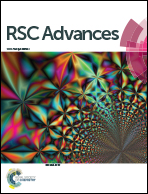N-Phenyl-substituted poly(benzimidazole imide)s with high glass transition temperature and low coefficient of thermal expansion
Abstract
To obtain high thermostable materials for flexible display substrates, a series of copoly(benzimidazole imide)s was prepared using 5-amine-2-(4-aminobenzene)-1-phenyl-benzimidazole (N-PhPABZ) and 6(5)-amino-2-(4-aminobenzene)-benzimidazole (PABZ). Incorporating N-phenyl groups effectively healed the brittleness of the poly(benzimidazole imide)s (PBIIs) derived from pyromellitic dianhydride (PMDA), and the resultant homo- and copoly(benzimidazole imide)s displayed an outstandingly high glass transition temperature (Tg > 450 °C) and a low coefficient of thermal expansion (CTE < 10 ppm K−1). Furthermore, the influence of removing intermolecular hydrogen bonds on the properties of these poly(benzimidazole imide)s was systematically analyzed. These data provide a feasible method to prepare superheat-resistant poly(benzimidazole imide)s without H-bonding.



 Please wait while we load your content...
Please wait while we load your content...